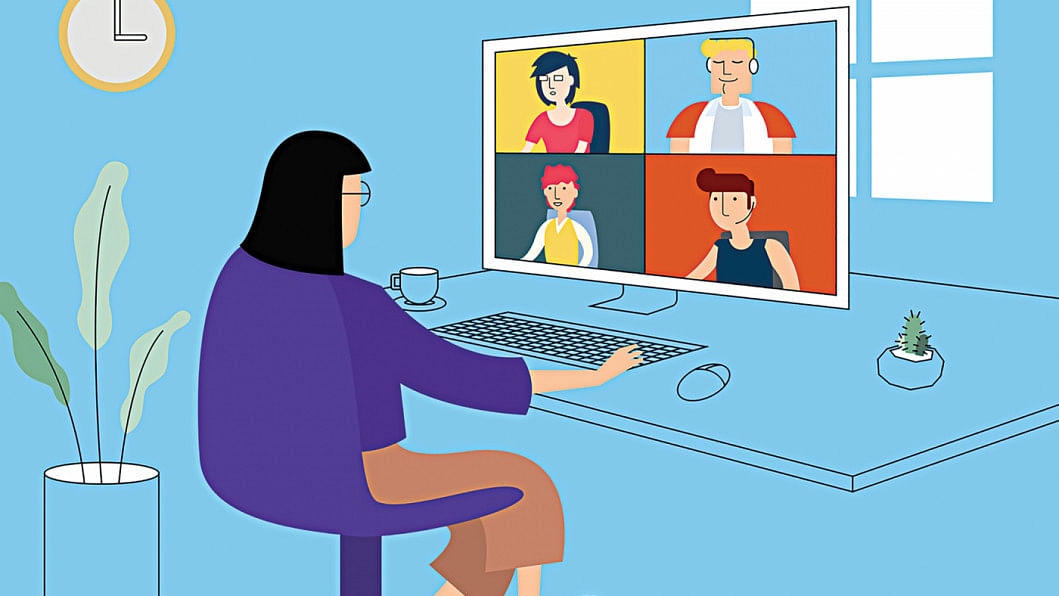Work from Home: A problematic convenience?

Life, be it personal or professional, does not look the way it used to six months ago. Post Covid-19, the biggest change that has happened is perhaps the intertwining of our personal and professional lives thanks to the "work from home" culture. While some people appreciate this change, others are sceptical about its sustainability.
For most people, being at the comfort of their home and working at their own space is very important for them to work not only efficiently but also in a comfortable headspace. The constant hassle of commuting or even just the preparation one needs to take before leaving the house for work is mentally and physically taxing. Sarwar Khalid, a CSE student from North South University (NSU) who also teaches students from home said, "You don't have to go through the hassle of going to your workplace and can be at the comfort of your home."
This personal space, however, comes at the cost of a more disciplined and scheduled life. When asked about keeping up with this new normal, third-year NSU business student and part-timer at a marketing agency Tabassum Mostazir* said, "I feel like I am having to work more hours than I usually do. Since we are not able to get out of the house, employers and clients assume that we are free all the time and assign us to work at odd times in the day with very unreasonable deadlines.
"Even if we are at home all the time, for students who are part-time workers, it is difficult to always be available given we still have to do online classes and prepare for exams. In fact, we have even more on our hands now as teachers give us more work because they know we will be home all day. This vagueness of work hours has completely messed up my schedule," she added.
On the other hand, people who usually have to travel a lot for work are cherishing the respite that work from home has to offer. Being able to spend time with their family whilst working can be immensely gratifying for some individuals.
Muktadir Rahman, Director of Transnational Education at London School of Commerce said, "I am connected to all my staff and my CEO from home, whereas it takes a lot of travel time to meet them normally, which has decreased my travel time and allows me to work more effectively while spending time with my family."
However, this increased family time comes at the cost of accessibility for some. Without proper investment in making technology more accessible and affordable, inequality is perpetuated in many facets of life. This work culture enables individuals, but only the ones who are capable of enabling themselves with technology and information crucial to facilitate this process.
When asked about her experience, Zarrin Tasnim, a fourth-year EEE student at Islamic University of Technology (IUT) who also works as a content writer for Fraktal Creative said, "While telecommuting has accelerated work pace it has been difficult for others to adapt. I believe it saves time for a student and helps me to do multitasking. I would prefer tele-workforce to be continued after the pandemic but without providing sufficient technical facilities it will become a privilege to few and remain impossible to many".
There are also certain jobs that just cannot be done from home. For a lot of people, this is the terrifying truth. Looking after your work, or even physical work that requires your presence is a big downside of the current ongoing work culture.
Humayun Kabir Khandaker, Deputy General Manager of Utah Groups Limited, a multinational garments company said, "It is impossible to work from home for people like us who need to look after every aspect of production. Hence working from home is extremely unproductive for us due to the nature of work we do."
There is also a group of people who are indecisive about their feelings regarding this transition. They are usually older or middle-aged people who have not retired yet but not also in their prime working years either.
Mohammad Niaz Murshed, a professor of Physics and Mathematics at NSU, said, "My emotions are somewhat mixed. Working from home is fun because it is all done from home, but teaching technical material appears to be challenging (at times) in the online setting."
So, if we want to give a verdict about the work from home culture, it is probably too soon to tell but one thing is certain, this new normal of work isn't ideal. It has its good sides, but some changes definitely need to be made to make it more accessible if we are to adapt to this in the long run.
Megha would rather be in a conference room than be in a zoom call. You can tell her about your preference at [email protected]

 For all latest news, follow The Daily Star's Google News channel.
For all latest news, follow The Daily Star's Google News channel. 



Comments